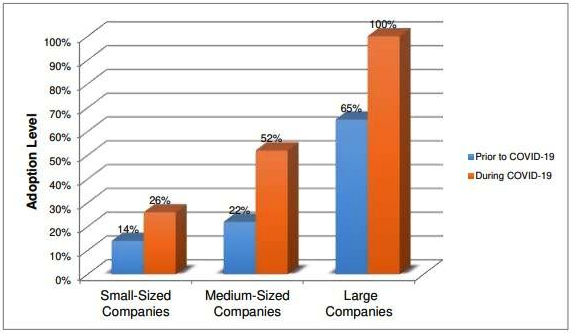By Edidiong Ekong
Firstly, what is uncertainty, and what does it have to do with marketing? In simple terms, uncertainty may be described as a situation that is typified by insufficient information, making it difficult to accurately predict current circumstances or future consequences. In marketing, it refers to the unpredictability of the market, customer behaviour and marketing effort outcomes. Some of the reasons for such uncertainty include economic instability, geopolitical conflicts, and technological advancements. These causes, while quite diverse, are all significantly dependent on geographical, cultural and contextual variables. Moreover, customer anxiety stimuli that are present in one specific market can be removed by innovative solutions and adaptability in another market. This occurs even more in the contemporary marketing setting that has been greatly revolutionised by the evolution of digital technologies.
The introduction of Artificial Intelligence and big data brought transformation in the marketing landscape. Its advent came with unprecedented accuracy in terms of customisation and automation. Top global organisations like Amazon, Procter & Gamble and Netflix make use of these tools to streamline their operations from inventory management to ad targeting. Their decision has been met with success and accelerating change.
For digital marketers in this fast-evolving and volatile marketplace, there is a need to operate amidst a landscape not just overshadowed by tools of unprecedented power but also by more complex conditions. Adversities persist through rising levels of inflation, supply chain volatility, and the unpredictable behaviour of consumer confidence. In African markets, these adversities are further enhanced by volatile exchange rates, poor infrastructure and slowly evolving regulatory bodies. Scenario Planning, swift adaptability and a compelling narrative are the only ways digital marketers can stay proactive, not reactive, in these uncertain conditions.
The Strategic Response: Planning Amid Chaos
The current inflationary, currency volatile, regulatory uncertain, and AI shock-prone African and global marketing landscape renders it essential to develop agile yet solid strategies.
Using Spotahome as a case study, Moi and Cabiddu (2020) highlight how agile marketing can help digital marketers lead in their respective niche. Agile marketing employs agile methodology and practices, originally used in software development, in the marketing field. It focuses on reducing the gap between a ‘need identified’ and ‘learning deployed’. Scenario planning is an aspect of agile marketing that allows businesses to anticipate changes in the market and create flexible responses to them. They can identify the causes and iteratively respond to changing conditions.
Spotahome had to maintain operations during an unstable and dynamic world economy caused by COVID-19. The company utilised weekly and quarterly planning formats to forecast future opportunities. The plans were regularly updated according to seasonal fluctuations and shifting objectives. The system allowed for easy and effective transfer of resources and responsibilities even when operating under constrained financial situations. The COVID-19 pandemic more than hastened this shift for most companies. Cultural organisations had to transition from conventional platforms to online forms of media. Marketing initiatives were promptly adjusted, prioritising online communication, reordered programming, and rearranged annual calendars.
This underscores the importance of implementing scenario planning to stay above unforeseen situations.
Where there is uncertainty, organisations must also be able to make alterations in their marketing budgets. They can then react to diminishing revenue, changed goals, or unexpected shifts in the marketplace. During the pandemic, most cultural institutions experienced severe reductions in marketing budgets. They slashed offline expenses on conventional advertising and focused on digital media. SMEs were particularly at a disadvantage since they had less financial capital and poorer IT infrastructure. Large companies could invest more in digital channels and remain visible. Spotahome was financially nimble by pulling back some marketing efforts while simultaneously prioritising other initiatives. While only a small portion saw this strategy as a success, this pivot allowed them to remain visible in marketing during the crisis.
Real-time monitoring is another aspect of agile marketing. Spotahome employed analytical software to monitor website traffic, keyword visibility, as well as consumer behaviour. It also revealed areas of poor performance every week, which aids strategic decision-making. Media sentiment was also measured by the organisation, and messaging was adjusted by the market accordingly. This real-time feedback mechanism allowed the company to stay connected to customers’ needs and changes in the operating environment.
Cultural institutions also followed digital technologies in response to the pandemic. Working with reduced budgets, they increased social media platform visibility and used video content to reach their audiences. These technologies enabled the maintenance of audience engagement and supported brand communication, even without physical events.
Storytelling that Anchors Trust and Loyalty
To engage the audience more, a good story is required. Ge, F. (2024) takes the example of the Douyin (TikTok) marketing campaign used by GWM (Great Wall Motors) to explain how real storytelling renders brands more amiable. GWM improved customer interaction by asking users to share their real stories. These stories being relatable to their customers, particularly the youth, spurred massive engagement on their social media. They also partnered with influencers, which helped further expand reach without losing emotional connection.
Spotahome and South Africa’s #MeetSouthAfrica tourism campaign did something similar. Spotahome offered verified videos, tours, and detailed listings to allow users to “live the experience without being there”. In the case of the #MeetSouthAfrica tourism campaign, travellers were persuaded to share personal experiences online, building a digital library of real stories that increased visibility and relatability through user-generated content.
Customer trust is the by-product of well-done storytelling. Transparency is at the forefront for GWM and Spotahome. GWM establishes credibility through alignment with users’ lives, and Spotahome eliminates scepticism in the rent process through emphasis on verified listings and flexible policy. South Africa’s campaign enhanced trust by highlighting real traveller voices, responding to increased demand for real experiences rather than glossed-over promotions. Cultural sensitivity supports resonance. Each firm localises content to domestic tongues, traditions, and media—WeChat and Douyin in China, Europe-wide localised campaigns for Spotahome. In each environment, adjusting tone, message, and medium to audience expectations renders communication natural, not alien. Brand voice consistency—online and offline—locks in familiarity and loyalty. GWM’s sleek, tech-savvy tone continues from social media posts to showrooms. Spotahome’s voice is simplicity and efficiency, ringing through its app, website, and customer service channels. It delivers coherence—brands become familiar, trustworthy, and memorable.
Speed as a Competitive Advantage
Another urgent focal point in marketing through uncertainty is speed. Implementing these strategies while staying competitive requires a quick iterative approach – the capability to respond fast to ambiguous situations and make smart decisions. The move to reduced planning cycles and weekly campaign iterations has been a signature strategy for agile brands.
Spotahome, a global online housing company, operates with weekly objectives and accompanying tracking reports that gauge performance and strategise according to them. The reports prioritise customer activity and areas of underperformance, and this enables the company to pivot rapidly and inexpensively. Spotahome continuously releases minor updates and new features on the website with minimal effort and cost. This allows the company to keep up to date with customer demand without over-extending resources. The firm also has a policy of “embracing simplicity”, wherein the goal is to do more with less, simplifying processes without compromising value. Social media applications like Instagram have adopted the technologies to design shoppable posts, which essentially shorten the buying process duration. Figures indicate that 80% of consumers are better capable of making fully informed decisions on the platform, with 54% having a higher propensity to purchase when product details are readily accessible.
Speed also involves learning from others and moving on market opportunities. In Nigeria, several brands have utilised competitive analysis to move quickly and expand. One telco brand identified poor call quality as a market issue and used the information to improve its network. The move resulted in a 15% increase in market share within a year. A fintech company tracked user experience trends and focused on seamless integration with local banks, quickly registering success by filling a market niche. These samples demonstrate the immense worth of both speed of action and rapid generation of insight. Being able to act rapidly—and precisely—differentiates top-performing brands in volatile environments, whether that comes from weekly analysis or competitive intelligence.
In conclusion, the marketing space is unpredictable and will continue to be uncertain. Therefore, digital marketers operating in these environments must always remember that marketing is less about visibility and more about being able to remain proactive regardless of the conditions. The brands that win are those who anticipate changes, move quickly and tell stories that touch hearts.
About Writer:
Edidiong Ekong is a seasoned growth and marketing leader with experience driving scale at both startups and multinational tech companies. He has led end-to-end go-to-market strategies, built high-performing teams, and delivered measurable business growth across diverse sectors. Edidiong is passionate about helping brands stand out in competitive markets and mentoring the next generation of marketing talent.







Comment
No comments found.